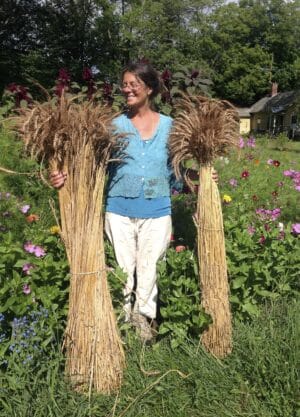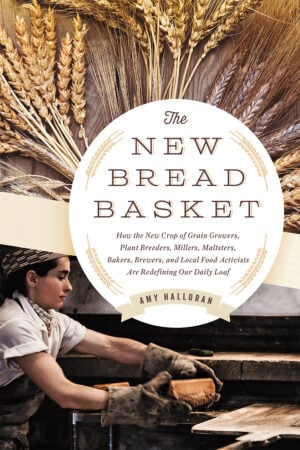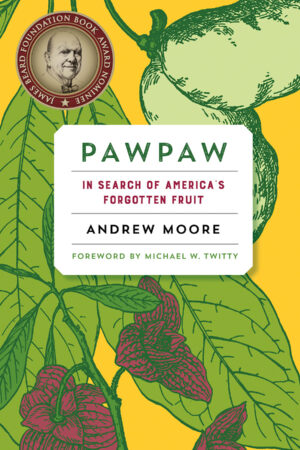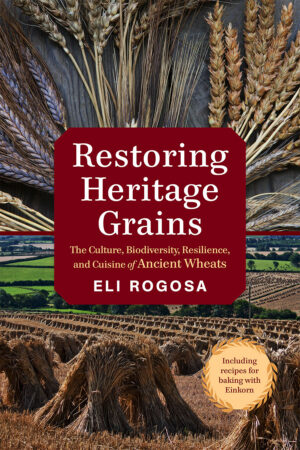Restoring Heritage Grains
The Culture, Biodiversity, Resilience, and Cuisine of Ancient Wheats
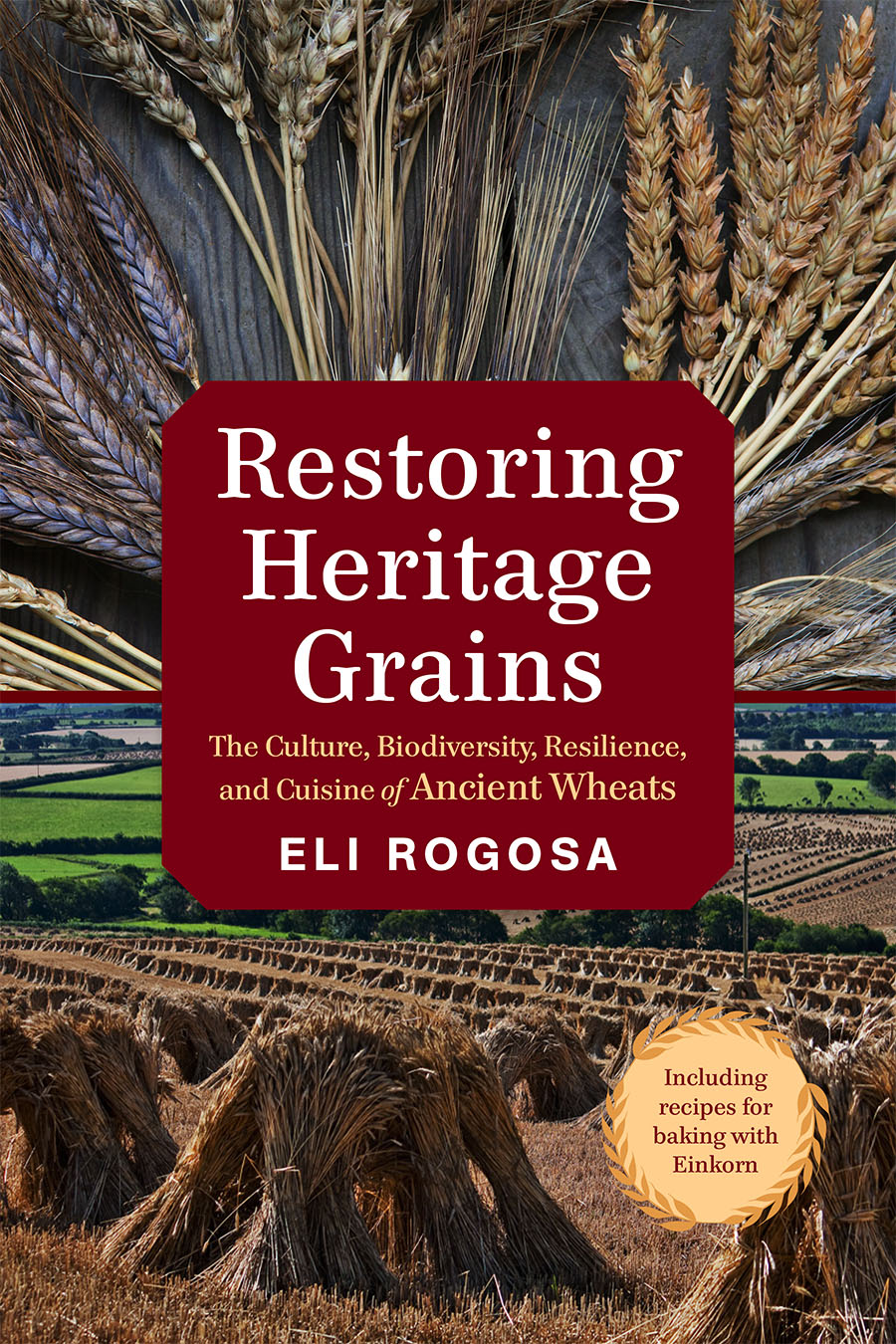
| Pages: | 272 pages |
| Book Art: | 16-page color insert |
| Size: | 6 x 9 inch |
| Publisher: | Chelsea Green Publishing |
| Pub. Date: | July 1, 2016 |
| ISBN: | 9781603586702 |
Restoring Heritage Grains
The Culture, Biodiversity, Resilience, and Cuisine of Ancient Wheats
Including recipes for baking with Einkorn
Wheat is the most widely grown crop on our planet, yet industrial breeders have transformed this ancient staff of life into a commodity of yield and profit—witness the increase in gluten intolerance and ‘wheat belly’. Modern wheat depends on synthetic fertilizer and herbicides that damage our health, land, water, and environment. Fortunately, heritage ‘landrace’ wheats that evolved over millennia in the organic fields of traditional farms do not need bio-chemical intervention to yield bountifully, are gluten-safe, have rich flavor and high nutrition. Yet the robust, majestic wheats that nourished our ancestors are on the verge of extinction.
In Restoring Heritage Grains, author Eli Rogosa of the Heritage Grain Conservancy, invites readers to restore forgotten wheats such as delicious gluten-safe einkorn that nourished the first Neolithic farmers, emmer—the grain of ancient Israel, Egypt, and Rome that is perfect for pasta and flatbreads, rare durums that are drought-tolerant and high in protein, and many more little known wheat species, each of which have a lineage intertwined with the human species and that taste better than any modern wheat.
Restoring Heritage Grains combines the history of grain growing and society, in-depth practical advice on landrace wheat husbandry, wheat folk traditions and mythology, and guidelines for the Neolithic diet with traditional recipes for rustic bread, pastry and beer. Discover the ancient grains that may be one of the best solutions to hunger today, and provide resilience for our future.
Reviews and Praise
Choice-
"This work is a thought-provoking polemic against industrial wheat and its negative impact on the environment and human health. Rogosa, who has conducted work in biodiversity preservation and is also a farmer, argues that heritage wheat varieties or landrace grains, such as einkorn, are more biodiverse, more healthful, easier to grow, and essential for the ecosystem. Growing these grains is covered in detail—in fact, a significant portion of the book is aimed at farmers or gardeners looking to grow landrace grains and/or wishing to troubleshoot common problems. Along with the discussion on growing the crops, the author delves into folk traditions regarding the consumption of these grains and historical recipes. In addition to her environmental argument, Rogosa is a passionate advocate for replacing modern wheat and links its development with a variety of health issues, such as the rise in celiac disease and digestive ailments. Though Rogosa is a thorough researcher and an engaging writer, the audience this book is aimed toward is likely to be the most sympathetic to her cause. This title is an engaging and stimulating work, but its narrow, mostly agricultural content makes it a peripheral purchase for academic libraries. Summing Up: Optional. All readers.”
More Reviews and Praise
Foreword Reviews-
"While wheat continues to serve as an important part of the Western diet, today’s wheat itself is radically different from that eaten in earlier centuries. It is that contradiction that Eli Rogosa explores in Restoring Heritage Grains, an interesting and informative volume about how humans have altered the world’s wheat supply. Rogosa explains how the various kinds of wheat that once flourished across Europe were gradually homogenized, from the Romans planting easy-to-maintain wheats that could quickly reinforce their supply lines, to the Soviet Union instituting a common agricultural approach throughout Eastern Europe. She also highlights the way that agribusiness has changed the wheat crop in the United States, replacing diverse ‘landrace' seeds with genetically modified crops designed to be resistant to weeds, but which likely play a role in the rapid growth of gluten allergies. Beyond diagnosing these problems, however, Rogosa presents a thorough solution. She describes the variety of wheats available, from durum to spelt to Indian wheat, highlighting the advantages of each, and explains how best to grow these heritage grains. She covers where these crops grow most effectively, and how they can be used to restore soil that is often ruined by mandates to produce mass quantities of wheat. She also explains harvesting techniques and shares personal stories of traveling to different parts of the world to speak with farmers about how they restore and protect their native landrace seeds. The text of Restoring Heritage Grains is nicely supplemented with images that visually demonstrate the diversity of these ancient grains. The book also includes a useful resources section with information about seed banks, and—perhaps best of all—a selection of recipes that make use of heritage grains. Whether of traditional cookies, pie crust, pizza, or challah, these recipes provide opportunities to practice what Rogosa preaches, and to taste the different flavors heritage wheats offer."
“Eli Rogosa has delivered to us, her many fans, the long-awaited book, Restoring Heritage Grains, in which she totally blows the lid off of this historic moment in the world of bread. She not only artfully guides us through thousands of years of the history and botanical evolution of wheat but also, prophetically, shows us its very future. And now we all have access to Eli’s inner world, to the passion that has been fermenting within her for many years and now exists forever through her brilliant words.”--Peter Reinhart, educator; author of Bread Revolution
“Most wheat grown worldwide today can be described as an in-bred, dwarfed, distant cousin of the genetically diverse, farmers’ landrace cereal crops of the past. Eli Rogosa argues passionately and convincingly in her book that from many perspectives, including food security and nutritional value, our landrace cereals need to be brought back from the brink of extinction. Eli illustrates the central role of cereals in human civilization as we know it, including in myth and religion and how this role has been traduced by agribusiness interests. Eli adds valuable advice and knowledge for the grower and the cook on preservation and use of our cereal crop inheritance.”--Andy Forbes, secretary, Brockwell Bake Association, London, UK
“In this book, agro-anthropologist, farmer, and baker Eli Rogosa helps us rediscover ancient landrace and traditional pre-Green Revolution wheats—varieties that are more delicious, nutritious, drought-resistant, and resilient than modern wheats, and that are already organic-adapted. The author covers everything from the romantic to the practical: personal stories about finding individual plants of rare wheats in Israel; historical and anthropological information; methods for growing, harvesting, and threshing; as well as many detailed recipes. A must read for anyone who has a garden or farm and who likes good bread.”--Carol Deppe, author of The Tao of Vegetable Gardening
“Restoring Heritage Grains is both poetic and practical. Eli Rogosa first tells the sad story of how the Green Revolution transformed the staff of life into a toxic-drenched monocrop. Then she shares the joyful story of her life’s work discovering, growing, distributing the seed and spreading the word about heritage grains. She makes a compelling case for heirloom landraces, the deep-rooted, diverse gene pools that coevolve with changing conditions, “people and seeds” finding ways to survive through climate challenges. Along the way, she recounts the history of wheat from the earliest human discoveries through ancient and modern Near East and European history, including the new world of the Americas. She lingers over the early millennia of matriarchy and the sacred rituals of many different peoples. Especially striking is her account of ancient Israeli practices as a sophisticated community food system based on social justice. This is a book to cherish.”--Elizabeth Henderson, author of Sharing the Harvest
“Eli Rogosa has lived among the world’s few remaining peasant farmers who continue to cultivate landrace wheat seeds and traditions. She has collected and faithfully tended and multiplied their unique local varieties, learned their traditional production techniques, and recorded their special recipes. She brought them to her home in New England and crossed them to combine their qualities and adapt them to the very different climate of their new home. Now, in Restoring Heritage Grains, she shares the wealth of information that she has preserved and the flavor of the seeds that she has saved, with people in this country and around the world.”--Klaas Martens, farmer, Lakeview Organic Grain, Penn Yan, NY
“This is a marvelous book, which I will read again and again over the years. Eli has woven a tapestry of fact and flavour, drawing on botanical, agricultural, nutritional, and folk information never before assembled under one cover. And she has included practical information on how to make delicious bread and beer. She has described how the first farmers were ‘evolutionary plant breeders’ and worked with nature to create the biodiverse crops we now call ‘heritage’ grains. Sadly, much of this diversity was lost as farmers abandoned their traditional crops for modern varieties, beguiled by promises of bumper yields and a ‘green revolution’ that would feed the world. Unfortunately, these yield increases have been achieved at immense environmental, social, and nutritional costs. This book is a critique of industrial agriculture, but it is also a practical manual for how to reintroduce diversity into our farming systems by growing heritage grains, and how we can help repair our spiritual relationship with the earth.”--John Letts, archaeo-botanist and farmer, Heritage Harvest Ltd., Oxford, UK
“This beautiful book is unlike any other publication on wheat or grains that I have ever read. Written poetically, it is a rare mix of science, history, and culture; therefore, the book will be equally inspiring for scientists, students, farmers, seed savers, culinary experts, or just any person looking for interesting reading. With this book, Eli gives us a key to restoring our bread of life.”--Mariam Jorjadze, director, Biological Farming Association Elkana (Georgia)
“Let yourself be inspired by the inflammable enthusiasm of Eli Rogosa about the diversity of ancient wheats, their historical backgrounds, and notes from her many encounters in different countries. The author brings these wheats not only into your stomach with lots of recipes, but also into your heart, which is the most important step on their way into the fields, where they can develop in our modern times into what wheat should be for humans: a well-balanced partner that can help us to cultivate our minds, our bodies, and our sentiments.”--Dr. Karl-Josef Mueller, biodynamic cereal breeder at Cereal Breeding Research, Neu Darchau, Germany
“Restoring Heritage Grains offers a veritable treasure trove from the past, yet one that is very relevant for today! The book introduces truly healthier, more nutritious, beautiful, and exciting grains to cultivate in your garden and farm and to enhance your palate. Read, grow, preserve, eat, and enjoy ancient grains for a biodiversity of taste and nourishment!”--John Jeavons, author, How to Grow More Vegetables; executive director of Ecology Action
“Our common cultural history goes all the way back to the very roots of civilization: the domestication of the cereals 12,000 years ago. In page after page of this book, Eli Rogosa’s profound knowledge, love, and passion for our common culinary and genetic heritage links our history with our daily bread, and fills the reader with enthusiasm to go into the field, and into the kitchen, to follow her example: Grow it, bake it, and eat it! Eli Rogosa’s quest for restoring quality bread from heritage grains is not only for the sake of your own health but to restore what unites us all, and thereby a mission of peace.”--Dr. Anders Borgen, organic wheat breeder, Denmark
“Eli Rogosa deserves credit for pioneering the current return of interest in heritage grains. In a compelling and inspiring book, she retraces her own voyage of discovery into the beauty and importance of endangered grain varieties, the tragic loss of their presence in our fields and diets, and how we can participate in returning this most ancient of foods to our tables. Her wide-ranging work is a powerful reminder of the depth of our connection to the first crops cultivated by humans.”--Sylvia Davatz, Solstice Seeds
Reviews and Praise
Choice-
"This work is a thought-provoking polemic against industrial wheat and its negative impact on the environment and human health. Rogosa, who has conducted work in biodiversity preservation and is also a farmer, argues that heritage wheat varieties or landrace grains, such as einkorn, are more biodiverse, more healthful, easier to grow, and essential for the ecosystem. Growing these grains is covered in detail—in fact, a significant portion of the book is aimed at farmers or gardeners looking to grow landrace grains and/or wishing to troubleshoot common problems. Along with the discussion on growing the crops, the author delves into folk traditions regarding the consumption of these grains and historical recipes. In addition to her environmental argument, Rogosa is a passionate advocate for replacing modern wheat and links its development with a variety of health issues, such as the rise in celiac disease and digestive ailments. Though Rogosa is a thorough researcher and an engaging writer, the audience this book is aimed toward is likely to be the most sympathetic to her cause. This title is an engaging and stimulating work, but its narrow, mostly agricultural content makes it a peripheral purchase for academic libraries. Summing Up: Optional. All readers.”
Foreword Reviews-
"While wheat continues to serve as an important part of the Western diet, today’s wheat itself is radically different from that eaten in earlier centuries. It is that contradiction that Eli Rogosa explores in Restoring Heritage Grains, an interesting and informative volume about how humans have altered the world’s wheat supply. Rogosa explains how the various kinds of wheat that once flourished across Europe were gradually homogenized, from the Romans planting easy-to-maintain wheats that could quickly reinforce their supply lines, to the Soviet Union instituting a common agricultural approach throughout Eastern Europe. She also highlights the way that agribusiness has changed the wheat crop in the United States, replacing diverse ‘landrace' seeds with genetically modified crops designed to be resistant to weeds, but which likely play a role in the rapid growth of gluten allergies. Beyond diagnosing these problems, however, Rogosa presents a thorough solution. She describes the variety of wheats available, from durum to spelt to Indian wheat, highlighting the advantages of each, and explains how best to grow these heritage grains. She covers where these crops grow most effectively, and how they can be used to restore soil that is often ruined by mandates to produce mass quantities of wheat. She also explains harvesting techniques and shares personal stories of traveling to different parts of the world to speak with farmers about how they restore and protect their native landrace seeds. The text of Restoring Heritage Grains is nicely supplemented with images that visually demonstrate the diversity of these ancient grains. The book also includes a useful resources section with information about seed banks, and—perhaps best of all—a selection of recipes that make use of heritage grains. Whether of traditional cookies, pie crust, pizza, or challah, these recipes provide opportunities to practice what Rogosa preaches, and to taste the different flavors heritage wheats offer."
“Eli Rogosa has delivered to us, her many fans, the long-awaited book, Restoring Heritage Grains, in which she totally blows the lid off of this historic moment in the world of bread. She not only artfully guides us through thousands of years of the history and botanical evolution of wheat but also, prophetically, shows us its very future. And now we all have access to Eli’s inner world, to the passion that has been fermenting within her for many years and now exists forever through her brilliant words.”--Peter Reinhart, educator; author of Bread Revolution
“Most wheat grown worldwide today can be described as an in-bred, dwarfed, distant cousin of the genetically diverse, farmers’ landrace cereal crops of the past. Eli Rogosa argues passionately and convincingly in her book that from many perspectives, including food security and nutritional value, our landrace cereals need to be brought back from the brink of extinction. Eli illustrates the central role of cereals in human civilization as we know it, including in myth and religion and how this role has been traduced by agribusiness interests. Eli adds valuable advice and knowledge for the grower and the cook on preservation and use of our cereal crop inheritance.”--Andy Forbes, secretary, Brockwell Bake Association, London, UK
“In this book, agro-anthropologist, farmer, and baker Eli Rogosa helps us rediscover ancient landrace and traditional pre-Green Revolution wheats—varieties that are more delicious, nutritious, drought-resistant, and resilient than modern wheats, and that are already organic-adapted. The author covers everything from the romantic to the practical: personal stories about finding individual plants of rare wheats in Israel; historical and anthropological information; methods for growing, harvesting, and threshing; as well as many detailed recipes. A must read for anyone who has a garden or farm and who likes good bread.”--Carol Deppe, author of The Tao of Vegetable Gardening
“Restoring Heritage Grains is both poetic and practical. Eli Rogosa first tells the sad story of how the Green Revolution transformed the staff of life into a toxic-drenched monocrop. Then she shares the joyful story of her life’s work discovering, growing, distributing the seed and spreading the word about heritage grains. She makes a compelling case for heirloom landraces, the deep-rooted, diverse gene pools that coevolve with changing conditions, “people and seeds” finding ways to survive through climate challenges. Along the way, she recounts the history of wheat from the earliest human discoveries through ancient and modern Near East and European history, including the new world of the Americas. She lingers over the early millennia of matriarchy and the sacred rituals of many different peoples. Especially striking is her account of ancient Israeli practices as a sophisticated community food system based on social justice. This is a book to cherish.”--Elizabeth Henderson, author of Sharing the Harvest
“Eli Rogosa has lived among the world’s few remaining peasant farmers who continue to cultivate landrace wheat seeds and traditions. She has collected and faithfully tended and multiplied their unique local varieties, learned their traditional production techniques, and recorded their special recipes. She brought them to her home in New England and crossed them to combine their qualities and adapt them to the very different climate of their new home. Now, in Restoring Heritage Grains, she shares the wealth of information that she has preserved and the flavor of the seeds that she has saved, with people in this country and around the world.”--Klaas Martens, farmer, Lakeview Organic Grain, Penn Yan, NY
“This is a marvelous book, which I will read again and again over the years. Eli has woven a tapestry of fact and flavour, drawing on botanical, agricultural, nutritional, and folk information never before assembled under one cover. And she has included practical information on how to make delicious bread and beer. She has described how the first farmers were ‘evolutionary plant breeders’ and worked with nature to create the biodiverse crops we now call ‘heritage’ grains. Sadly, much of this diversity was lost as farmers abandoned their traditional crops for modern varieties, beguiled by promises of bumper yields and a ‘green revolution’ that would feed the world. Unfortunately, these yield increases have been achieved at immense environmental, social, and nutritional costs. This book is a critique of industrial agriculture, but it is also a practical manual for how to reintroduce diversity into our farming systems by growing heritage grains, and how we can help repair our spiritual relationship with the earth.”--John Letts, archaeo-botanist and farmer, Heritage Harvest Ltd., Oxford, UK
“This beautiful book is unlike any other publication on wheat or grains that I have ever read. Written poetically, it is a rare mix of science, history, and culture; therefore, the book will be equally inspiring for scientists, students, farmers, seed savers, culinary experts, or just any person looking for interesting reading. With this book, Eli gives us a key to restoring our bread of life.”--Mariam Jorjadze, director, Biological Farming Association Elkana (Georgia)
“Let yourself be inspired by the inflammable enthusiasm of Eli Rogosa about the diversity of ancient wheats, their historical backgrounds, and notes from her many encounters in different countries. The author brings these wheats not only into your stomach with lots of recipes, but also into your heart, which is the most important step on their way into the fields, where they can develop in our modern times into what wheat should be for humans: a well-balanced partner that can help us to cultivate our minds, our bodies, and our sentiments.”--Dr. Karl-Josef Mueller, biodynamic cereal breeder at Cereal Breeding Research, Neu Darchau, Germany
“Restoring Heritage Grains offers a veritable treasure trove from the past, yet one that is very relevant for today! The book introduces truly healthier, more nutritious, beautiful, and exciting grains to cultivate in your garden and farm and to enhance your palate. Read, grow, preserve, eat, and enjoy ancient grains for a biodiversity of taste and nourishment!”--John Jeavons, author, How to Grow More Vegetables; executive director of Ecology Action
“Our common cultural history goes all the way back to the very roots of civilization: the domestication of the cereals 12,000 years ago. In page after page of this book, Eli Rogosa’s profound knowledge, love, and passion for our common culinary and genetic heritage links our history with our daily bread, and fills the reader with enthusiasm to go into the field, and into the kitchen, to follow her example: Grow it, bake it, and eat it! Eli Rogosa’s quest for restoring quality bread from heritage grains is not only for the sake of your own health but to restore what unites us all, and thereby a mission of peace.”--Dr. Anders Borgen, organic wheat breeder, Denmark
“Eli Rogosa deserves credit for pioneering the current return of interest in heritage grains. In a compelling and inspiring book, she retraces her own voyage of discovery into the beauty and importance of endangered grain varieties, the tragic loss of their presence in our fields and diets, and how we can participate in returning this most ancient of foods to our tables. Her wide-ranging work is a powerful reminder of the depth of our connection to the first crops cultivated by humans.”--Sylvia Davatz, Solstice Seeds


